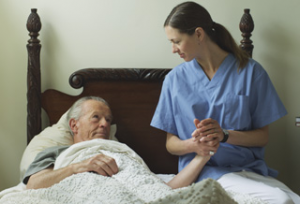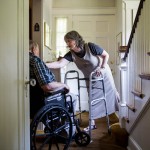Patients recovering from debilitating medical conditions need nursing like a hand needs a glove in freezing winter conditions. When it comes to seeking nursing services, you can go about it in two ways. The traditional way is to seek rehabilitation in a nursing home. However, in recent years, home health providers Seminole have become popular as they allow patients to get at home nursing care .
At No Place Like Home Care LLC, we are proud to say that we are among the home health providers to have come to the fore. In this post, we will tell you why at home nursing care makes more sense than recovering in a nursing home setting. We hope you find this post informative, and if you want to know more about at home nursing care, remember, we are only a phone call away!
1. Home recovery tends to be more effective
For elderly patients, recovering from a medical condition or injury at a nursing home or hospital can make for traumatic experiences. The reason for this is simple – at nursing homes and hospitals, caregivers have to pay attention to numerous patients. At the end of the day, it’s important to remember that caregivers are human too, and excessive stress can overwhelm them. However, this stress can trickle down to patients and affect how they are treated.
Due to the stress involved in caring for multiple patients, caregivers and nurses in a nursing home or hospital fail to provide personalized care. However, when a nurse is dedicated to caring for only one patient, and that too in the patient’s home, it can work wonders. The nurse can devote all the attention and care to one patient. This leads to a high degree of personalization.
Also, at home nursing facilitates the building of emotional connections between caregivers and patients. These connections allow caregivers to empathize more with the patients and their respective conditions, which in turn facilitates better care. So, if you want your recovery to be effective, choose at home recovery with No Place Like Home Care LLC, a reputed health care agency Seminole.
2. Patients can recover in the comfort of their homes
Arguably the biggest advantage of at home nursing care over a nursing home or hospital is the fact that it allows patients to recover in their homes. On the surface, this probably doesn’t seem like much of an advantage. However, once you scratch the surface, it becomes easy to understand why home recovery can be advantageous, particularly for elderly patients.
Comfort and familiarity are two of the biggest priorities for almost every elderly patient. Quite simply, without them, the recovery is likely to be slow. In worst-case situations, patient recoveries may completely stall simply because patients are not in an environment where they feel safe and secure.
With elder care assistance Seminole from No Place Like Home Care LLC, you can let your home environment contribute to your recovery. From a psychological standpoint, the home environment can be incredibly helpful. After all, would you rather recover in the alien environment of a nursing home or hospital? Or would you like to be surrounded by people you love and a caregiver who is completely devoted to you?
3. Low infection risks
In a nursing home or hospital setting, infection risks tend to be high as these facilities house multiple patients simultaneously. Even if a single patient is carrying a highly infectious, contagious, or viral disease, the entire facility along with its staff and other patients runs the risk of being infected. Even if the whole facility and sanitized and disinfected, the chances of widespread contamination can only be reduced to an extent and not eliminated altogether.
If a patient’s health has already deteriorated due to a debilitating disease, the last thing needed is a secondary infection. Additionally, patients with existing health conditions tend to be prone to infections as their immune systems remain vulnerable due to the presence of the existing conditions. For such patients, secondary infections can spell doom.
However, when you choose elder care assistance Seminole from No Place Like Home Care LLC, you can bid goodbye to those infection risks. Our caregivers are trained to reduce the spread of infection by engaging in necessary sanitizing and disinfecting procedures. So, even if a patient is carrying a deadly bacterial, viral, or fungal infection, the rest of the family won’t be affected. Get in touch with No Place Like Home Care LLC today, especially if you or anyone you know is a recovering patient with low immunity.
4. Companionship and healthcare expertise combined
A No Place Like Home Care LLC caregiver is much more than a health professional designed to look after patients’ medical needs. We train our caregivers to be companions, as we understand that elderly patients often feel lonely, especially if their family members aren’t around them.
From helping with household chores to running errands to dressing to bathing and beyond, you can expect our caregivers to step up when your family members are absent. At the same time, our caregivers will constantly monitor your vitals such as heart rate, weight, blood pressure, blood sugar, and respiration. If a patient’s health does worsen, our caregivers can formulate rapid action plans to seek immediate medical assistance.
With this combination of companionship and healthcare expertise, No Place Like Home Care LLC can ensure holistic recovery. Reach out to us to know more about how we help patients overcome their health issues through optimism, organization, and emotional well-being.
No Place Like Home Care LLC; High-quality Home Healthcare
No Place Like Home Care LLC is a company based in Florida that specializes in home care services for elderly patients. We are proud to say that we are among the most reputed names in Florida when it comes to quality in-home healthcare and rehabilitative services.
The No Place Like Home Care LLC name is not only in the spotlight because of our high-quality medical care services. We also make it a point to price our services competitively. This ensures that people of all backgrounds, irrespective of their incomes, can access quality in-home healthcare services.










